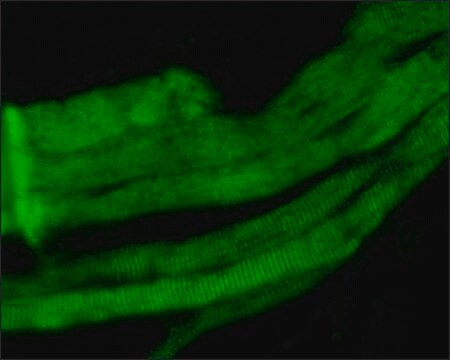추천 제품
생물학적 소스
rabbit
Quality Level
항체 형태
purified antibody
항체 생산 유형
primary antibodies
클론
polyclonal
종 반응성
mouse, human
기술
immunocytochemistry: suitable
NCBI 수납 번호
UniProt 수납 번호
배송 상태
wet ice
타겟 번역 후 변형
unmodified
유전자 정보
human ... SH3PXD2A(9644)
일반 설명
Tks5 (previously known as Fish), is a large scaffolding protein with one amino-terminal PX domain and five SH3 domains. It is cytoplasmic in normal fibroblasts. In Src-transformed cells, Tks5 localizes to podosomes. The coexpression of Tks5 and constitutively active Src in epithelial cancer cells resulted in the appearance of podosomes/invadopodia. Cells with reduced Tks5 expression are poorly invasive through matrigel. Tks5 is expressed and localized to podosomes/invadopodia in some invasive human cancer cell lines and tumor tissue, particularly breast cancers and melanomas. Thus, Tks5 appears to be required for podosome/invadopodia formation and for invasion of some cancer cells.
면역원
Epitope: 833-892 aa
Recombinant Protein, aa: 833-892
애플리케이션
Anti-TKS5 (SH3 #4) Antibody is an antibody against TKS5 (SH3 #4) for use in IC.
Research Category
Cell Structure
Cell Structure
Research Sub Category
Cytoskeletal Signaling
Cytoskeletal Signaling
품질
Evaluated by immunocytochemistry on mouse 3T3-Src(Y527F) cells.
표적 설명
130-150 kDa Uncharacterized bands(s) may be observed in some cell lysates.
물리적 형태
Format: Purified
Protein A purified
Purified in 0.1M Tris-Glycine (pH7.4) 150mM NaCl with 0.05% NaN3.
저장 및 안정성
Maintain at 2-8°C in undiluted aliquots for up to 1 year after date of receipt.
분석 메모
Control
Mouse 3T3-Src(Y527F) cells
Mouse 3T3-Src(Y527F) cells
기타 정보
Concentration: Please refer to the Certificate of Analysis for the lot-specific concentration.
면책조항
Unless otherwise stated in our catalog or other company documentation accompanying the product(s), our products are intended for research use only and are not to be used for any other purpose, which includes but is not limited to, unauthorized commercial uses, in vitro diagnostic uses, ex vivo or in vivo therapeutic uses or any type of consumption or application to humans or animals.
적합한 제품을 찾을 수 없으신가요?
당사의 제품 선택기 도구.을(를) 시도해 보세요.
Storage Class Code
12 - Non Combustible Liquids
WGK
WGK 1
Flash Point (°F)
Not applicable
Flash Point (°C)
Not applicable
시험 성적서(COA)
제품의 로트/배치 번호를 입력하여 시험 성적서(COA)을 검색하십시오. 로트 및 배치 번호는 제품 라벨에 있는 ‘로트’ 또는 ‘배치’라는 용어 뒤에서 찾을 수 있습니다.
Lidia Chellini et al.
Matrix biology : journal of the International Society for Matrix Biology, 81, 17-33 (2018-10-28)
The invasive phenotype of serous ovarian cancer (SOC) cells is linked to the formation of actin-based protrusions, invadopodia, operating extracellular matrix (ECM) degradation and metastatic spread. Growth factor receptors might cause engagement of integrin-related proteins, like the polarity protein IQ-domain
Cameron P Bracken et al.
The EMBO journal, 33(18), 2040-2056 (2014-07-30)
The microRNAs of the miR-200 family maintain the central characteristics of epithelia and inhibit tumor cell motility and invasiveness. Using the Ago-HITS-CLIP technology for transcriptome-wide identification of direct microRNA targets in living cells, along with extensive validation to verify the
Pilar Cejudo-Martin et al.
PloS one, 9(9), e107674-e107674 (2014-09-27)
Tks5 is a scaffold protein and Src substrate involved in cell migration and matrix degradation through its essential role in invadosome formation and function. We have previously described that Tks5 is fundamental for zebrafish neural crest cell migration in vivo.
Olivia R Grafinger et al.
Journal of cell science, 133(9) (2020-03-25)
Malignant cancer cells can invade extracellular matrix (ECM) through the formation of F-actin-rich subcellular structures termed invadopodia. ECM degradation at invadopodia is mediated by matrix metalloproteinases (MMPs), and recent findings indicate that membrane-anchored membrane type 1-matrix metalloproteinase (MT1-MMP, also known
Helene H Jensen et al.
PloS one, 10(11), e0141871-e0141871 (2015-11-05)
Enteropathogenic Escherichia coli (EPEC) is a bacterial pathogen that infects the epithelial lining of the small intestine and causes diarrhea. Upon attachment to the intestinal epithelium, EPEC uses a Type III Secretion System to inject its own high affinity receptor
자사의 과학자팀은 생명 과학, 재료 과학, 화학 합성, 크로마토그래피, 분석 및 기타 많은 영역을 포함한 모든 과학 분야에 경험이 있습니다..
고객지원팀으로 연락바랍니다.







